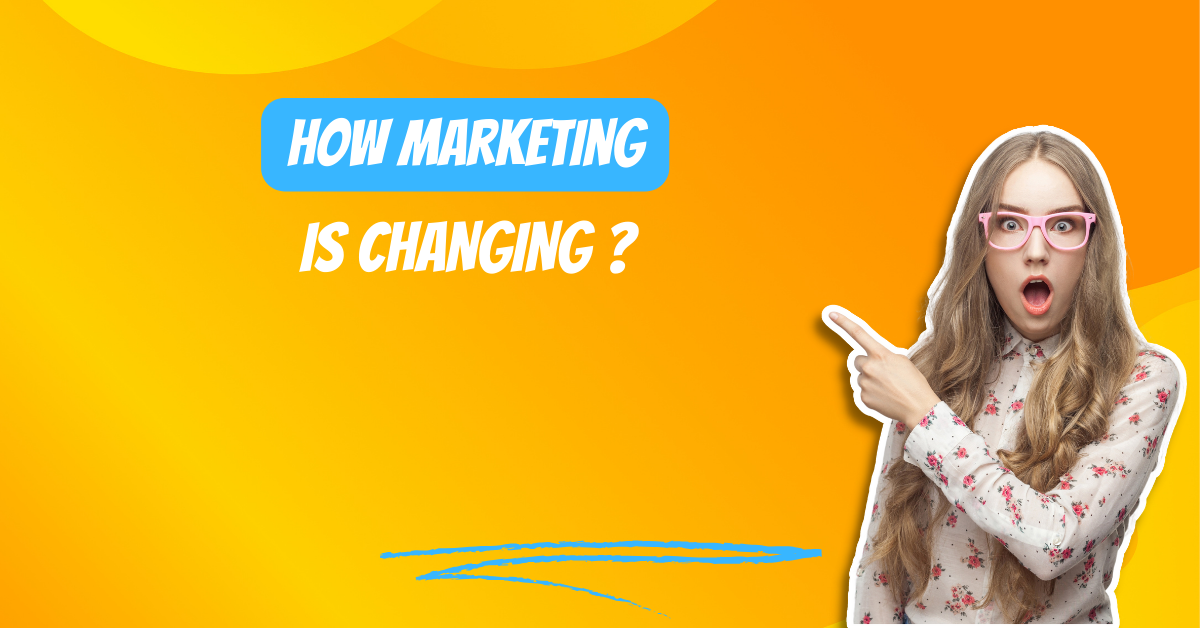
the art and science of promoting products and services, has always been a dynamic field, constantly adapting to changes in technology, consumer behavior, and market trends. In recent years, marketing has experienced a significant transformation, driven by the rapid evolution of digital platforms and the way consumers interact with brands. In this 3000-word exploration, we will delve into the various aspects of how marketing is changing and the key trends shaping the marketing landscape in the modern era.
I. The Digital Revolution
The digital revolution has been one of the most profound changes in the marketing industry. It has disrupted traditional marketing channels and introduced new paradigms that have reshaped the way businesses reach and engage with their audiences.
- The Rise of Online Advertising
Digital marketing has become the cornerstone of modern advertising. Traditional mediums like print and TV have been supplemented, and in some cases, replaced by digital channels such as search engine marketing, social media advertising, and online display ads. This shift allows businesses to target their audiences with pinpoint precision, thanks to data-driven insights and audience segmentation.
- The Role of Content Marketing
Content marketing has become a linchpin in digital strategies. High-quality, relevant content helps businesses establish their authority, engage audiences, and build trust. Blog posts, videos, podcasts, and infographics are essential tools for creating compelling narratives and connecting with consumers on a deeper level.
- SEO and SEM : The New Marketing Arsenal
Search Engine Optimization (SEO) and Search Engine Marketing (SEM) are essential components of modern marketing. They help businesses improve their online visibility and reach potential customers who actively search for products or services. Algorithms continuously change, pushing marketers to stay updated and adapt their strategies accordingly.
II. Data-Driven Marketing
The abundance of data in the digital age has empowered marketers with insights into consumer behavior and preferences. Data-driven marketing leverages this information to create personalized and effective campaigns.
- The Power of Analytics
Marketing analytics tools provide a wealth of information, from website traffic patterns to customer demographics. Marketers use this data to measure the effectiveness of their campaigns and make data-driven decisions to optimize strategies.
- Personalization and Customer Segmentation
Marketers are increasingly personalizing their messages and content to cater to the specific needs and preferences of their audiences. Customer segmentation allows for precise targeting, resulting in higher engagement and conversion rates.
- AI and Machine Learning
Artificial intelligence and machine learning are revolutionizing marketing. These technologies analyze data at scale, automate tasks, and enhance the customer experience. Chatbots, recommendation engines, and predictive analytics are just a few examples of AI applications in marketing.
III. Social Media Marketing
Social media platforms have become integral to marketing strategies, offering a direct line of communication with customers and prospects.
- The Pervasiveness of Social Media
Social media is where consumers spend a significant portion of their online time. Marketers have shifted their focus to platforms like Facebook, Instagram, Twitter, and LinkedIn to connect with their audience.
- Influencer Marketing
Influencer marketing has gained prominence as a powerful approach to reach niche audiences. Brands collaborate with social media influencers who have large and engaged followings to promote their products or services.
- User-Generated Content
User-generated content, such as customer reviews, photos, and videos, is increasingly being used to build trust and authenticity. Brands encourage customers to share their experiences and feedback, adding a human touch to marketing efforts.
IV. The Changing Customer Journey
The way consumers make purchasing decisions has evolved significantly, altering the marketing funnel as we know it.
- The Zero Moment of Truth (ZMOT)
Google introduced the concept of the Zero Moment of Truth, representing the point at which a potential customer researches a product or service before purchasing. Modern marketing strategies need to address this critical phase by providing informative content that guides consumers during their research.
- Multi-Channel Marketing
Consumers now use multiple channels to gather information. They might start on social media, conduct online research, read reviews, and visit a physical store before making a purchase. Marketers must have an omnichannel approach to ensure consistency and continuity throughout the customer journey.
- Customer-Centric Marketing
Today’s consumers expect personalized experiences, prompt responses, and seamless interactions. Customer-centric marketing means putting the customer at the center of your strategy, addressing their needs, concerns, and preferences.
V. The Ethics of Marketing
As marketing evolves, the ethical considerations surrounding it become increasingly important. Consumers are more conscious of how their data is used and how brands conduct themselves in the marketplace.
- Data Privacy and Consent
Regulations like GDPR and CCPA have brought data privacy to the forefront. Marketers must ensure they have proper consent to collect and use customer data and be transparent about their practices.
- Social Responsibility
Consumers now expect brands to take a stand on social and environmental issues. Companies that engage in ethical business practices and demonstrate social responsibility often gain a competitive edge.
- Transparency and Authenticity
Transparency in marketing is crucial. Authenticity and honesty in advertising build trust with consumers, leading to long-term brand loyalty.
VI. The Mobile-First Approach
Mobile devices have become the primary gateway to the digital world, and marketers must adapt to this mobile-first reality.
- Mobile Optimization
Websites, emails, and advertising campaigns must be optimized for mobile devices. Slow-loading pages or a poor mobile user experience can drive potential customers away.
- Mobile Apps
The rise of mobile apps has opened new opportunities for businesses to engage with their audiences. Mobile apps can offer personalized experiences, loyalty programs, and direct communication channels.
- Mobile Advertising
Mobile advertising, including in-app ads and location-based marketing, allows businesses to target consumers on their smartphones and tablets. This is a crucial part of any modern marketing strategy.
VII. The Future of Marketing
As marketing continues to change, it’s important to look ahead and anticipate future developments.
- Augmented and Virtual Reality
Augmented reality (AR) and virtual reality (VR) are emerging as powerful tools for marketing. Brands can create immersive experiences, enabling customers to interact with products before purchasing.
- Voice Search and Smart Devices
The growth of voice-activated devices like Amazon Echo and Google Home is changing the way consumers search for information and make purchases. Marketers are adapting their strategies to cater to this trend.
- Sustainability and Green Marketing
Sustainability is becoming a major consideration in marketing. Businesses that adopt eco-friendly practices and promote environmental responsibility are likely to gain favor with eco-conscious consumers.
Conclusion
Marketing is in a state of constant evolution, driven by technology, changing consumer behavior, and societal shifts. The digital revolution, data-driven marketing, social media, and a customer-centric approach have reshaped the industry. As marketing continues to change, ethics, transparency, and mobile-first strategies are becoming central to success.
Read More :- Best Digital Marketing Agency in Noida
Looking to the future, marketing will continue to adapt to emerging technologies like AR, VR, and voice search. Brands that embrace sustainability and social responsibility will likely thrive in a marketplace where consumers demand more than just products – they expect values and a genuine connection. Adapting to these changes and staying ahead of the curve is essential for businesses to remain competitive and relevant in the ever-evolving world of marketing.

